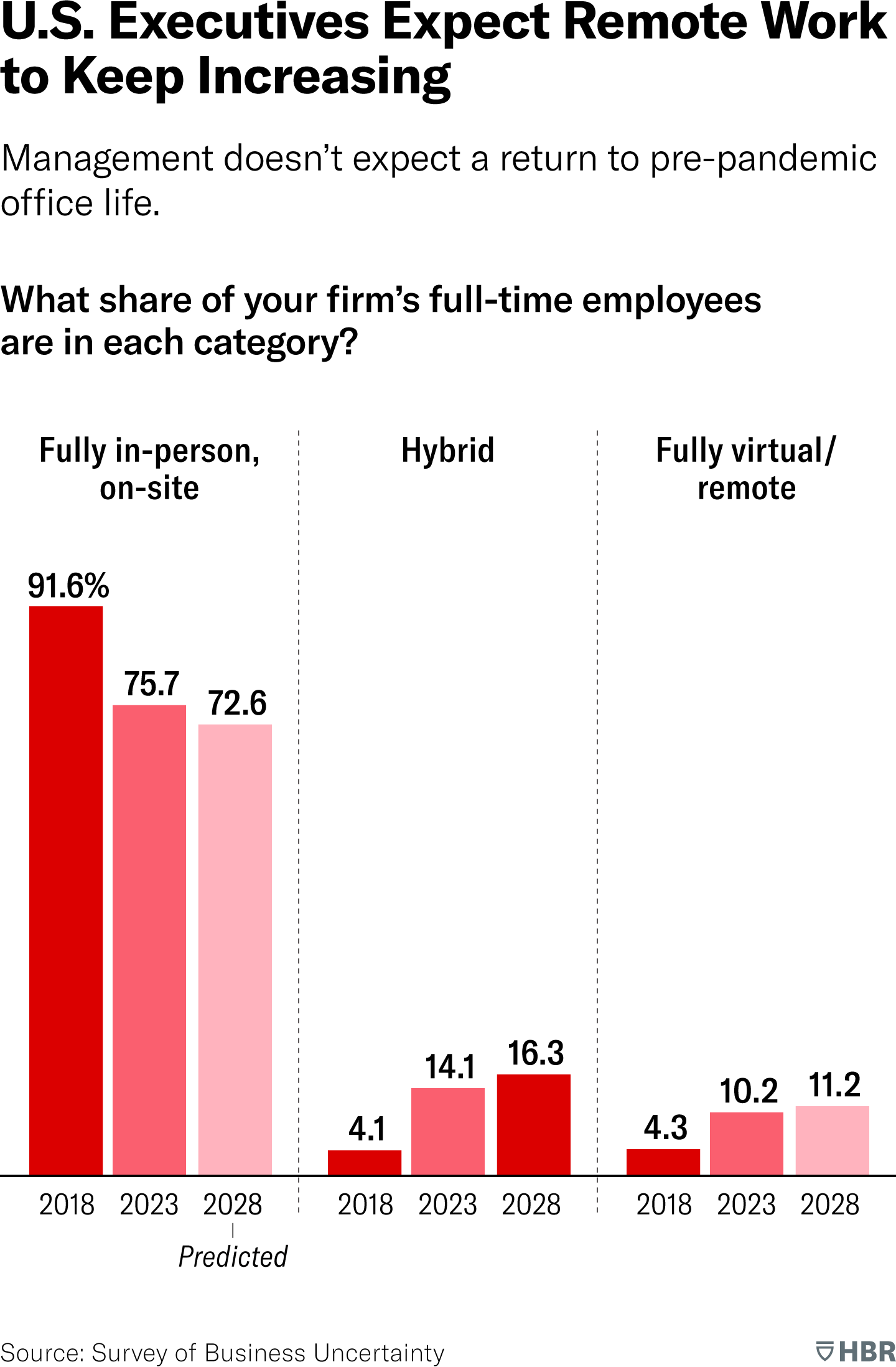The Tech Job Outlook for 2024
Executives predict that remote work will stay on the rise; while AI and machine learning, sustainability, web development and UX design, and cybersecurity will drive job creation in the tech industry in 2024.

How 2023 Positioned the Tech Job Market in 2024
The tech industry has weathered significant changes in recent years, marked by the pandemic, hiring fluctuations, and funding challenges. Despite these hurdles, the tech industry job market is showing signs of an upswing — making it, dare we say, an exciting time to embark on the tech job hunt.
Venture Capital Funding as a Key Marker for 2024 Tech Hiring
The venture capital funding landscape for the tech industry in 2023 faced challenges compared to previous years. Global investment in startups saw a decline of 38% year-over-year, reaching $285 billion, the lowest since 2018. Silicon Valley Bank’s collapse early in the year triggered much of this decline. Funding stages all experienced a downturn, with early-stage funding dropping by over 40%, late-stage funding decreasing by 37%, and seed funding falling by just over 30%.
However, AI startups have begun reshaping VC funding for a brighter future. In the U.S., AI startups captured one-third of all investments in 2023, highlighting the immense potential of this field. Leading organizations like Open AI played a significant role in driving this trend. AI continues to be a major focus for investors due to its ability to drive disruptive innovation.
Additionally, sectors closely related to tech are predicted to attract significant VC investment in 2024. These include the energy sector, shifting towards sustainable and efficient technologies, and the telecommunications industry being propelled by advancements like 5G and the Internet of Things. Industrial processes, pharmaceuticals, biotechnology, and media and entertainment are also expected to receive substantial investments — and these industries are increasingly intersecting with technology and actively seeking tech experts to drive their growth.
Although the funding outlook for 2024 is mixed, there are still opportunities. With a specific focus on the sector and innovations above, there is potential in the next year to shape the future of the tech industry as we know it.
How Remote Work is Changing the 2024 Tech Hiring Landscape
Remote work in the U.S. saw a significant increase to over 50% in 2020, but it has since settled around 28% in 2023. It's interesting to note that some top executives, including Meta’s Mark Zuckerberg, express skepticism about remote work. However, according to a survey by Harvard Business Review last year, executives anticipate that remote and hybrid work will continue to grow in the next five years. This increase in remote work can be attributed to advancements in technology, the growing number of startups embracing remote models, the suitability of the U.S. work environment for remote setups, and the preference of employees for the flexibility that remote work offers. The survey also suggests that implementing managed hybrid models could be an effective solution, as it would allow companies to maintain profitability while ensuring employee satisfaction and providing environmental benefits.


The pulse on 2024 suggests that remote work will continue to evolve — likely affecting the hiring landscape for the better. Hybrid work models will gain further ground, acknowledging the diversity of work styles and the need for flexibility. This LinkedIn report by Apna, focusing on Human Resources insights, notes that a focus for HR teams in the coming year will include redefining which and how roles can be performed remotely, creating inclusive schedules, and ensuring infrastructure and tech are in place to support new ways of working.
Global Talent: In 2024, we will also witness the era of truly global talent acquisition. With remote work staying strong, top companies will have the opportunity to tap into a vast international talent pool. This emerging trend brings about a transformation in recruitment strategies, enabling companies to access a diverse range of skills and cultural perspectives. In order to hire candidates from different time zones, languages, and cultural backgrounds — an increasing necessity for cross-functional and global teams — companies will need to be adaptable to location and work style.
An Upswing in Freelancing: The upcoming years will witness a significant shift as companies increasingly turn to freelancers for specialized tasks and projects. According to a report by Upwork, a whopping 58% of professionals who are not currently freelancing said they were considering it in the future. As the freelance industry continues to flourish in 2024, businesses will be necessitated to access key talent without requiring their physical presence.
The Return of the Digital Nomad: Relatedly, driven by Gen-Z’s continued entry into the workplace, more people will again be choosing to work from diverse locations globally. This trend will challenge businesses to develop policies and strategies that accommodate employees who embrace a location-independent lifestyle. Balancing the needs of the organization, compliance with tax & legal requirements in different regions, and employee expectations for flexibility is going to become an ongoing challenge.
Four Areas to Seek Tech Jobs in 2024
1. AI and Machine Learning
Artificial Intelligence (AI) and Machine Learning (ML) continue to stand at the forefront of technological advancement, increasingly influencing how businesses operate across various sectors. The surge in the adoption of generative AI has been particularly transformative, creating a burgeoning demand for professionals proficient in these technologies. This shift is not just about the technical prowess in AI and ML; it also necessitates a significant re-skilling effort within the workforce. As AI becomes more integrated into everyday business processes, from customer service automation to advanced data analytics, the need for AI-savvy talent is more crucial than ever. This trend underscores the importance of staying current with AI and ML developments and highlights the exciting potential for innovation and efficiency improvements these technologies offer.
2. Sustainability
The tech industry is increasingly aligning with the global push towards sustainability. This shift is leading to a wave of innovative projects and job opportunities that prioritize environmental goals. From developing eco-friendly tech products to optimizing energy use in data centers, the focus on sustainability is opening new avenues for technological innovation. The growing environmental awareness, coupled with regulatory pushes, is driving companies to explore sustainable technologies and practices. This trend is not only creating new jobs but also redefining existing ones, as tech leaders are now required to incorporate sustainability considerations into their work, be it in software engineering, data analysis, or hardware design.
3. Web Development and Digital Design
Web Development and Digital Design are experiencing a significant upswing, with a projected job growth rate of 16% from 2022 to 2032. This growth is indicative of the increasing importance of the digital realm in both personal and professional life. The demand for skilled web developers and digital designers is fueled by the need for functional, aesthetically pleasing, and user-friendly websites and applications across all industries. As more businesses and services move online, the ability to create engaging and effective digital experiences becomes paramount. This sector's growth is not just in numbers but also in the complexity and creativity of the roles, with employees increasingly required to have a blend of technical, design, and user experience skills.
4. Cybersecurity
The rise in remote work and digital services has significantly heightened the importance of cybersecurity. With more business operations and personal activities moving online in every sector, the need for robust security protocols is more critical than ever. This shift has led to a high demand for cybersecurity experts skilled in protecting digital assets and sensitive information against a growing array of cyber threats. The cybersecurity field is expanding beyond traditional roles, encompassing areas like cloud security, incident response, and threat intelligence. This trend highlights the evolving nature of digital threats and the ongoing need for innovative security solutions to protect both individuals and organizations in an increasingly digital world.
All in all, the tech job market in 2024 is poised for growth and diversification. With a focus on new technologies, proactive hiring practices, and a recovering funding landscape, tech hiring is looking up.
For more insights into the tech industry - and perspectives on emerging markets and roles - book a mentorship session with Merit:
